US gun law debate - what's changed since Newtown
- Published
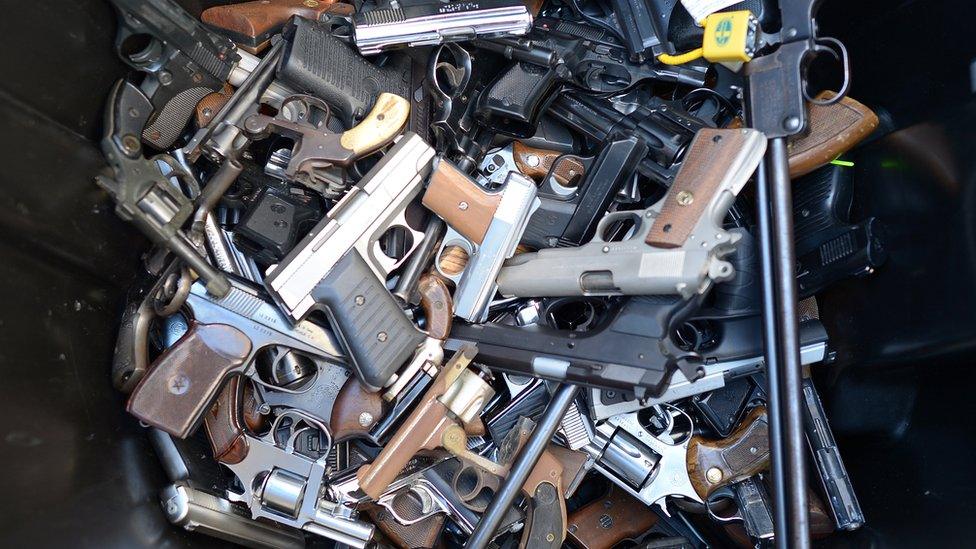
Gun ownership has increased since the school shootings in Newtown
The worst mass shooting in recent US history in Orlando on Sunday left 49 dead with dozens of people remaining in a hospital, some in a critical condition.
Once again, politicians are debating what to do about gun laws in the US following a tragedy.
There were similar moves after the 2012 Sandy Hook school shooting in Newtown, Connecticut, which left 26 people dead, most of them children.
But those pushing for change see signs that things might be going their way, while those opposed to reform can point to several factors that suggest the status quo will remain.
WHAT'S DIFFERENT THIS TIME...

1. A filibuster has raised hopes of those who want change
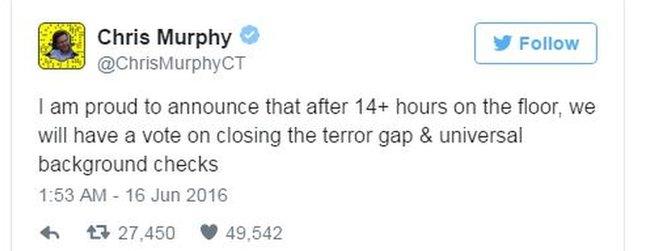
Led by Connecticut Senator Chris Murphy, whose state went through the Sandy Hook school shootings, the filibuster lasted 14 hours.
Mr Murphy said he wanted to force Republicans and Democrats to agree on legislation to deny terrorism suspects the right to buy guns and require universal background checks.
As a result of the filibuster, the Senate will hold a vote on gun control measures next week, though passing a bill is unlikely., external

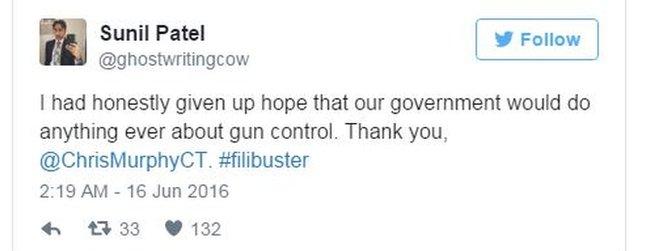
2. Gun laws are now an election issue
President Barack Obama has challenged the Republican-controlled Congress to pass new gun laws.
And Democratic presumptive nominee Hillary Clinton has also been campaigning on the issue.
But gun control is a very divisive issue in the US, where the right to bear arms is enshrined in the constitution.
Likely Republican nominee Donald Trump has pledged to protect gun rights and has said he would get rid of "gun-free zones".
He said more guns in the Orlando nightclub might have saved lives.
"Not one of Donald Trump's reckless ideas would have saved a single life in Orlando," Mrs Clinton said.
3. Some states have made it tougher to get guns
In the wake of the Sandy Hook shooting, many states tightened up their gun laws, including Connecticut, California and New York.
Six states have expanded background checks. But people wishing to purchase guns can usually travel to another state to do so.
And Kansas, Texas, Arkansas and Wisconsin, are a few states that have made gun rights more expansive than ever since Sandy Hook.
4. The debate is more emotional
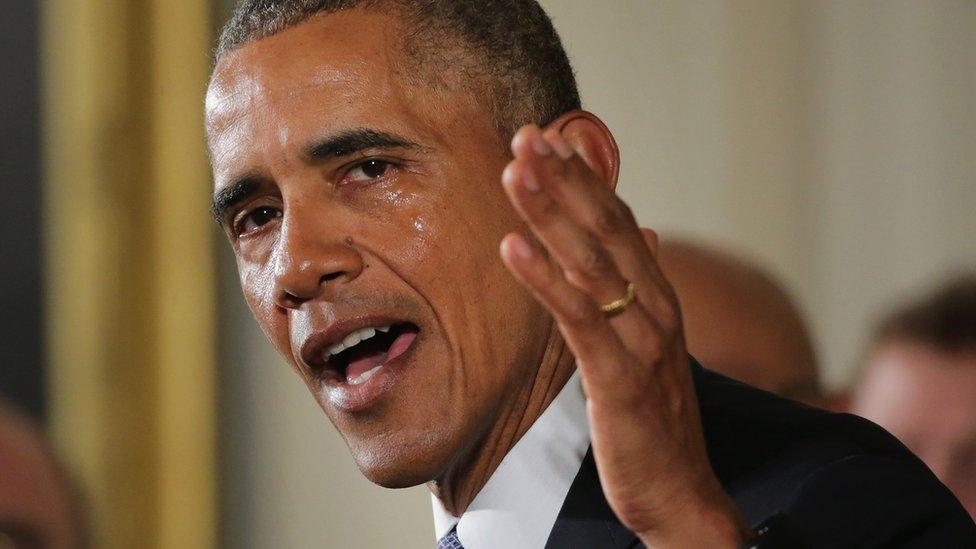
President Barack Obama tears up during gun control press conference in January

Lawmakers are increasingly being lambasted for only offering "thoughts and prayers" following shootings.
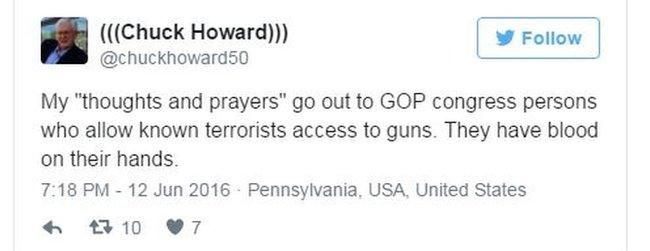
A visibly emotional Tammy Baldwin, a Democratic senator from Wisconsin, displayed a photo board of the victims as she spoke during the filibuster late on Wednesday, saying repeatedly: "Our thoughts and prayers are no longer enough."
Republican House Speaker Paul Ryan called for a moment of silence on the House floor on Monday and Democrats shouted him down, with a handful walking out.
5. Some Republicans are signalling they're open to change
This week Mr Trump said he was speaking to the National Rifle Association (NRA) on how to keep guns out of the hands of terrorists.
Republican Senators John Cornyn (Texas) and Pat Toomey (Pennsylvania) are both working on proposals that would be an alternative to the Democrats' plan for banning suspected terrorists from buying guns.
Mr Cornyn's plan has been endorsed by the NRA while Mr Toomey hopes to strike a deal that would please both Democrats and Republicans.
AND WHAT'S STILL THE SAME...

1. The assault weapons ban is still expired
There used to be an assault weapons ban in the US, but it expired in 2004 and has failed to pass again. After the Sandy Hook shootings, President Obama included an assault weapons ban in his proposals for sweeping gun reform, but it went nowhere.
Vice-President Joe Biden said this week that it took seven years for Congress to approve the assault weapons ban, and there is "no reason" why Democrats should ever stop trying to get it passed again.
2. Mass shootings still rising
Harvard University researchers published a study in 2014, external that showed that, according to their calculations, there has been a rise in public mass shootings and that they tripled from 2011 to 2014.
However, homicides with firearms have declined from a decade ago, and the overall murder rate in the country has gone down in recent years, according to the Centers for Disease Control and Prevention, external.
3. NRA still very powerful
The powerful National Rifle Association still influences many lawmakers.
The group says it has about five million members, though it is hard to confirm that number.
Membership increased sharply following the Sandy Hook massacre, though its financial disclosure forms for 2014 show its revenues dropped by $47 million (£33 million) from 2013 to 2014, external.
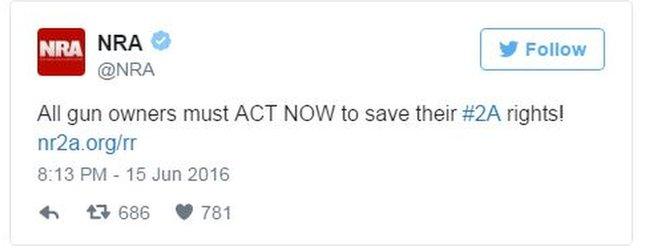
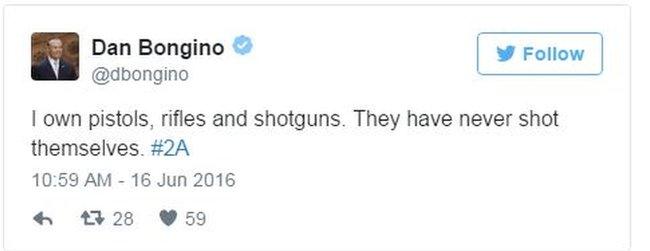

Wayne LaPierre, the president of the organisation, and officials who lobby Congress have been blamed by President Obama for preventing gun-control legislation and having an "extremely strong grip on Congress".
NRA supporters say their group is being unfairly blamed for shootings it did not commit and that mental health is the issue, not guns.
Why is US gun lobby NRA so controversial?
Many agree with Donald Trump when he says more "good guys with guns" would save lives.
One survivor of the Pulse nightclub shootings told the BBC that she wishes she had had a firearm to defend herself.
Kassandra Marquez, 23, survived the attack, but her cousin died.
"They need to have a gun control, but from my experience, the way I'm looking at things, until then, get your gun licence, because you're not safe anywhere."
Orlando shooting witness: Nowhere feels safe
4. Some sales don't require background checks
Jon Sopel reports from a gun show in America
The majority of vendors at gun shows are licensed but often, unlicensed sellers meet at the shows to show off their collections or sell guns, and unlicensed sellers do not put buyers through a federal background check.
Alleged Charleston gunman Dylann Roof was able to buy a gun because the FBI did not complete a background check on him within three business days, due to a clerical error. Arms dealers, under current law, can sell guns to individuals if they have not been notified by the FBI within three days that the sale would be illegal.
5. Gun violence research is still stymied
Despite lobbying from medical groups, the Centers for Disease Control is still banned from using federal funds to research gun violence in the US, thanks to a provision enacted in 1997.
Just this spring, a group of 141 medical organisations sent a letter to lawmakers urging them to restore funding for gun research. They wrote that the provision "has had a dramatic chilling effect" on researching gun violence.
"A central part of preventing future tragedies is through conducting rigorous scientific research as this has been a proven successful approach in reducing deaths due to other injuries," the letter reads, external.